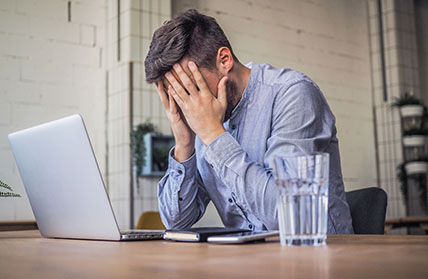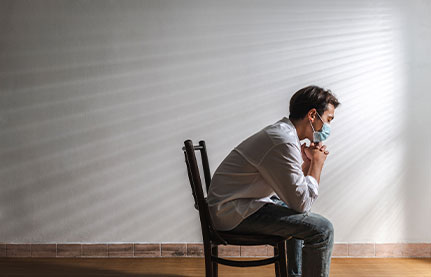Anxiety is something everyone experiences. It helps us know when something might be wrong by making us feel a certain way. Even though being anxious can be good or helpful in some situations, you might feel like it’s happening too often or that it’s more intense than it should be.
If you feel like you’re too anxious, we can help. The therapists at Ally Psych have helped hundreds of clients feel better and regain control. Let us help you slow down your racing thoughts and get you back to living life.

You find yourself filled with apprehensive expectations more days than not about one or more activities (like work or school).

Your mind feels like it’s going too fast to catch up, and you can’t seem to slow it down.

Even when you’re doing something relaxing, you feel like you have to be moving or doing something more.

You feel really tired easily, even after you do an activity that you don’t think should be tiring (like dishes or laundry).

You have a hard time focusing on what you’re doing because of your racing thoughts.

You feel easily annoyed or made angry, usually by smaller things that wouldn’t typically bother you as much.

You’ve noticed that your muscles are usually really tense. This can look like clenching your jaw or clenching your fists.

You have difficulty falling asleep or staying asleep. This is usually because your thoughts are racing.
The anxiety therapists at Ally Psychological Services understand that your anxiety can feel impossible to overcome. We know that you’ve probably already tried a lot of things to help yourself too. When you’re ready to start learning skills and working through your concerns, we’re ready to help.
Yes. Many therapies can treat anxiety, such as CBT, DBT, ACT, and EMDR. You can try to treat your anxiety with those therapies without medication and see if it helps. There are also nutritional supplements that a health care provider can recommend that may help with anxiety.
Anxiety is a normal human emotion, so it will never be totally gone. Instead, anxiety therapy will help reduce how intense and often you experience anxiety. Many clients begin experiencing relief from their anxiety in a matter of weeks.
The recommended treatment for anxiety is a combination of medication and therapy. While everyone has their own preferences and will respond differently, research shows that behavioral therapies like CBT, DBT, EMDR, or ERT can be very effective. Each of these therapies will teach you coping skills that you can use in your daily life to deal with your anxiety.
That depends. For some, anxiety is related directly to a specific event; once that concern resolves, so does the anxiety. For others, anxiety can be more chronic (long-lasting). The good news is that over the course of treatment, many people feel a significant reduction in symptoms and feel more able to manage their anxiety.
It’s important to let your provider know about your obsessive thoughts and rituals, as they may be a sign of a different condition called OCD. Though OCD and Anxiety are related, there are key distinctions between the two. Anxiety includes feeling nervous, irritable, or on edge. OCD is a condition where a person experiences unwanted thoughts or impulses that are obsessive and lead them to compulsive actions in an attempt to reduce the distress that comes with these thoughts.
No. stress and anxiety are two different things, even though symptoms can be very similar. People under stress experience mental and physical symptoms, such as irritability, anger, fatigue, muscle pain, digestive troubles, and difficulty sleeping. Anxiety, on the other hand, is defined by persistent, excessive worries that don’t go away even in the absence of a stressor. The biggest difference is that people with anxiety may experience their symptoms without any specific stressor.
When you’re ready to talk, we’re ready to listen. Fill out the form below to get in touch with Ally Psych and schedule your appointment.